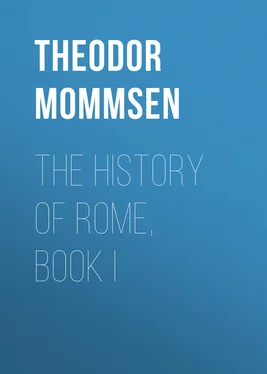Theodor Mommsen - The History of Rome, Book I
Здесь есть возможность читать онлайн «Theodor Mommsen - The History of Rome, Book I» — ознакомительный отрывок электронной книги совершенно бесплатно, а после прочтения отрывка купить полную версию. В некоторых случаях можно слушать аудио, скачать через торрент в формате fb2 и присутствует краткое содержание. Жанр: foreign_prose, История, foreign_edu, foreign_antique, на английском языке. Описание произведения, (предисловие) а так же отзывы посетителей доступны на портале библиотеки ЛибКат.
- Название:The History of Rome, Book I
- Автор:
- Жанр:
- Год:неизвестен
- ISBN:нет данных
- Рейтинг книги:5 / 5. Голосов: 1
-
Избранное:Добавить в избранное
- Отзывы:
-
Ваша оценка:
- 100
- 1
- 2
- 3
- 4
- 5
The History of Rome, Book I: краткое содержание, описание и аннотация
Предлагаем к чтению аннотацию, описание, краткое содержание или предисловие (зависит от того, что написал сам автор книги «The History of Rome, Book I»). Если вы не нашли необходимую информацию о книге — напишите в комментариях, мы постараемся отыскать её.
The History of Rome, Book I — читать онлайн ознакомительный отрывок
Ниже представлен текст книги, разбитый по страницам. Система сохранения места последней прочитанной страницы, позволяет с удобством читать онлайн бесплатно книгу «The History of Rome, Book I», без необходимости каждый раз заново искать на чём Вы остановились. Поставьте закладку, и сможете в любой момент перейти на страницу, на которой закончили чтение.
Интервал:
Закладка:
CHAPTER V
The Original Constitution of Rome
The Roman House
Father and mother, sons and daughters, home and homestead, servants and chattels—such are the natural elements constituting the household in all cases, where polygamy has not obliterated the distinctive position of the mother. But the nations that have been most susceptible of culture have diverged widely from each other in their conception and treatment of the natural distinctions which the household thus presents. By some they have been apprehended and wrought out more profoundly, by others more superficially; by some more under their moral, by others more under their legal aspects. None has equalled the Roman in the simple but inexorable embodiment in law of the principles pointed out by nature herself.
The House-father and His Household
The family formed an unity. It consisted of the free man who upon his father's death had become his own master, and the spouse whom the priests by the ceremony of the sacred salted cake (-confarreatio-) had solemnly wedded to share with him water and fire, with their son and sons' sons and the lawful wives of these, and their unmarried daughters and sons' daughters, along with all goods and substance pertaining to any of its members. The children of daughters on the other hand were excluded, because, if born in wedlock, they belonged to the family of the husband; and if begotten out of wedlock, they had no place in a family at all. To the Roman citizen a house of his own and the blessing of children appeared the end and essence of life. The death of the individual was not an evil, for it was a matter of necessity; but the extinction of a household or of a clan was injurious to the community itself, which in the earliest times therefore opened up to the childless the means of avoiding such a fatality by their adopting the children of others as their own.
The Roman family from the first contained within it the conditions of a higher culture in the moral adjustment of the mutual relations of its members. Man alone could be head of a family. Woman did not indeed occupy a position inferior to man in the acquiring of property and money; on the contrary the daughter inherited an equal share with her brother, and the mother an equal share with her children. But woman always and necessarily belonged to the household, not to the community; and in the household itself she necessarily held a position of domestic subjection—the daughter to her father, the wife to her husband, 27 27 This was not merely the case under the old religious marriage (-matrimonium confarreatione-); the civil marriage also (-matrimonium consensu-), although not in itself giving to the husband proprietary power over his wife, opened up the way for his acquiring this proprietary power, inasmuch as the legal ideas of "formal delivery" (-coemptio-), and "prescription" (-usus-), were applied without ceremony to such a marriage. Till he acquired it, and in particular therefore during the period which elapsed before the completion of the prescription, the wife was (just as in the later marriage by -causae probatio-, until that took place), not -uxor-, but -pro uxore-. Down to the period when Roman jurisprudence became a completed system the principle maintained its ground, that the wife who was not in her husband's power was not a married wife, but only passed as such (-uxor tantummodo habetur-. Cicero, Top. 3, 14).
the fatherless unmarried woman to her nearest male relatives; it was by these, and not by the king, that in case of need woman was called to account. Within the house, however, woman was not servant but mistress. Exempted from the tasks of corn-grinding and cooking which according to Roman ideas belonged to the menials, the Roman housewife devoted herself in the main to the superintendence of her maid-servants, and to the accompanying labours of the distaff, which was to woman what the plough was to man. 28 28 The following epitaph, although belonging to a much later period, is not unworthy to have a place here. It is the stone that speaks:— –Hospes, quod deico, paullum est. Asta ac pellige. Heic est sepulcrum haud pulcrum pulcrai feminae, Nomen parentes nominarunt Claudiam, Suom mareitum corde dilexit sovo, Gnatos duos creavit, horunc alterum In terra linquit, alium sub terra locat; Sermone lepido, tum autem incessu commodo, Domum servavit, lanam fecit. Dixi. Abei.- (Corp. Inscr. Lat. 1007.) Still more characteristic, perhaps, is the introduction of wool-spinning among purely moral qualities; which is no very unusual occurrence in Roman epitaphs. Orelli, 4639: -optima et pulcherrima, lanifica pia pudica frugi casta domiseda-. Orelli, 4861: -modestia probitate pudicitia obsequio lanificio diligentia fide par similisque cetereis probeis femina fuit-. Epitaph of Turia, i. 30: domestica bona pudicitiae, opsequi, comitatis, facilitatis, lanificiis [tuis adsiduitatis, religionis] sine superstitione, ornatus non conspiciendi, cultus modici.
In like manner, the moral obligations of parents towards their children were fully and deeply felt by the Roman nation; and it was reckoned a heinous offence if a father neglected or corrupted his child, or if he even squandered his property to his child's disadvantage.
In a legal point of view, however, the family was absolutely guided and governed by the single all-powerful will of the "father of the household" (-pater familias-). In relation to him all in the household were destitute of legal rights—the wife and the child no less than the bullock or the slave. As the virgin became by the free choice of her husband his wedded wife, so it rested with his own free will to rear or not to rear the child which she bore to him. This maxim was not suggested by indifference to the possession of a family; on the contrary, the conviction that the founding of a house and the begetting of children were a moral necessity and a public duty had a deep and earnest hold of the Roman mind. Perhaps the only instance of support accorded on the part of the community in Rome is the enactment that aid should be given to the father who had three children presented to him at a birth; while their ideas regarding exposure are indicated by the prohibition of it so far as concerned all the sons—deformed births excepted—and at least the first daughter. Injurious, however, to the public weal as exposure might appear, the prohibition of it soon changed its form from that of legal punishment into that of religious curse; for the father was, above all, thoroughly and absolutely master in his household. The father of the household not only maintained the strictest discipline over its members, but he had the right and duty of exercising judicial authority over them and of punishing them as he deemed fit in life and limb. The grown-up son might establish a separate household or, as the Romans expressed it, maintain his "own cattle" (-peculium-) assigned to him by his father; but in law all that the son acquired, whether by his own labour or by gift from a stranger, whether in his father's household or in his own, remained the father's property. So long as the father lived, the persons legally subject to him could never hold property of their own, and therefore could not alienate unless by him so empowered, or yet bequeath. In this respect wife and child stood quite on the same level with the slave, who was not unfrequently allowed to manage a household of his own, and who was likewise entitled to alienate when commissioned by his master. Indeed a father might convey his son as well as his slave in property to a third person: if the purchaser was a foreigner, the son became his slave; if he was a Roman, the son, while as a Roman he could not become a Roman's slave, stood at least to his purchaser in a slave's stead (-in mancipii causa-). The paternal and marital power was subject to a legal restriction, besides the one already mentioned on the right Of exposure, only in so far as some of the worst abuses were visited by legal punishment as well as by religious curse. Thus these penalties fell upon the man who sold his wife or married son; and it was a matter of family usage that in the exercise of domestic jurisdiction the father, and still more the husband, should not pronounce sentence on child or wife without having previously consulted the nearest blood-relatives, his wife's as well as his own. But the latter arrangement involved no legal diminution of power, for the blood-relatives called in to the domestic judgment had not to judge, but simply to advise the father of the household in judging.
Читать дальшеИнтервал:
Закладка:
Похожие книги на «The History of Rome, Book I»
Представляем Вашему вниманию похожие книги на «The History of Rome, Book I» списком для выбора. Мы отобрали схожую по названию и смыслу литературу в надежде предоставить читателям больше вариантов отыскать новые, интересные, ещё непрочитанные произведения.
Обсуждение, отзывы о книге «The History of Rome, Book I» и просто собственные мнения читателей. Оставьте ваши комментарии, напишите, что Вы думаете о произведении, его смысле или главных героях. Укажите что конкретно понравилось, а что нет, и почему Вы так считаете.











